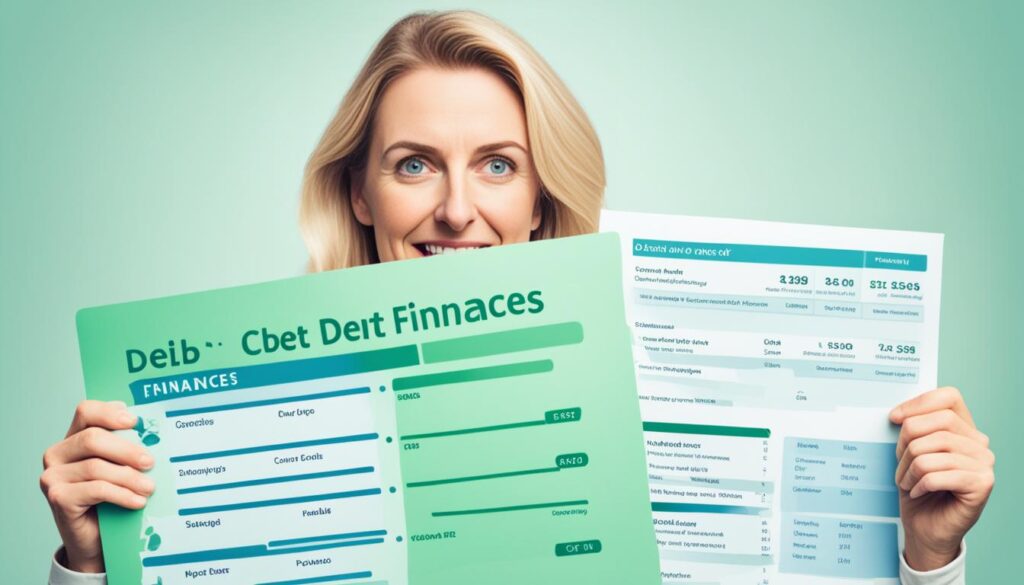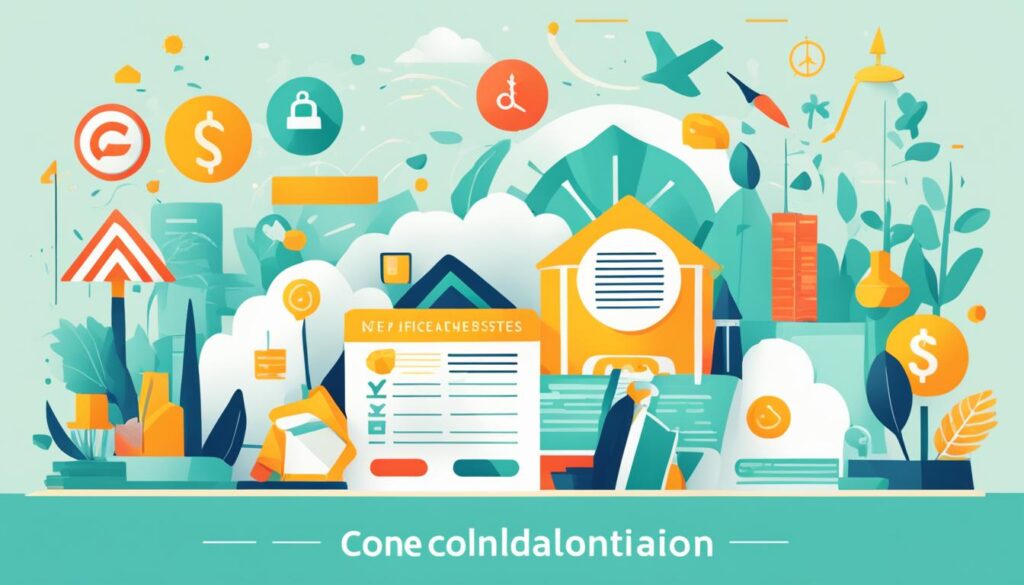Did you know that over 80% of Americans carry some form of debt? Whether it’s credit card balances, student loans, or medical bills, the burden of multiple debts can be overwhelming and stressful. But fear not, because there’s a solution that can help you simplify your finances and take control of your debt: debt consolidation.
Debt consolidation is a strategy that combines multiple debts into a single monthly payment, making it easier to manage and potentially lowering your interest rates. It provides a clear roadmap to becoming debt-free faster, giving you peace of mind and the opportunity to regain your financial freedom.
In this article, I’ll guide you through the world of debt consolidation and explore various methods, such as debt consolidation loans, debt settlement, and debt consolidation programs. We’ll discuss how to assess your debt situation, choose the right option, and manage your finances effectively after consolidation.
Click here to purchase Credit Secrets Bible on Amazon
So, if you’re ready to simplify your finances, reduce stress, and take back control of your debt, let’s dive into the world of debt consolidation!
Key Takeaways:
- Over 80% of Americans carry some form of debt.
- Debt consolidation combines multiple debts into a single monthly payment.
- Debt consolidation can help simplify your finances and lower your interest rates.
- Methods of debt consolidation include debt consolidation loans, debt settlement, and debt consolidation programs.
- Assessing your debt situation and choosing the right option are crucial steps in the debt consolidation process.
Understanding Debt Consolidation
Debt consolidation is a financial strategy that aims to simplify your debt management by combining multiple debts into a single, more manageable payment. It involves taking out a new loan or enrolling in a debt consolidation program to pay off existing debts. The primary objective of debt consolidation is to streamline your finances and make it easier to keep track of your payments.
Consolidating your debts offers several benefits, especially for individuals who find themselves struggling with multiple payments. Firstly, it can help lower your overall interest rate, potentially saving you money in the long run. By consolidating high-interest debts, such as credit card debt, into a single loan with a lower interest rate, you can reduce the amount of money you spend on interest payments each month.
Additionally, debt consolidation can simplify your financial life by combining multiple debts into a single payment. Instead of juggling various due dates and payment amounts, you’ll only need to remember to make one payment each month. This can help reduce the chances of missing payments, which can negatively impact your credit score.
Another advantage of debt consolidation is that it can provide you with a clear plan for repaying your debts. Through a consolidation loan or program, you’ll have a structured repayment schedule that outlines when and how much you need to pay each month. This can help you stay organized and motivated as you work towards becoming debt-free.
Debt consolidation is not a one-size-fits-all solution, and its effectiveness depends on your individual circumstances. It’s essential to assess your financial situation and explore different consolidation options to find the best fit for your needs. In the following sections, we’ll dive deeper into the various methods of debt consolidation and provide guidance on choosing the right option for you.
Click here for credit repair product suggestions on Amazon
Different Methods of Debt Consolidation
In this section, I’ll outline different debt consolidation methods, including debt consolidation loans, debt settlement, and enrolling in a debt consolidation program. Each option has its own pros and cons, allowing you to choose the one that best suits your financial needs and goals.
Debt Consolidation Loan
A debt consolidation loan is a type of personal loan used to combine multiple debts into a single loan. By taking out a loan, you can pay off all your existing debts, leaving you with one monthly payment to manage. This can simplify your finances and potentially reduce your overall interest rates, saving you money over time. However, it’s important to consider your eligibility for the loan, including your credit score and income, as well as any associated fees or interest rates.

Debt Settlement
Debt settlement involves negotiating with your creditors to settle your debts for less than the full amount you owe. This option is typically pursued when you are struggling to make your monthly payments and unable to qualify for a consolidation loan. Debt settlement companies work on your behalf to negotiate lower settlement amounts with your creditors, helping you reduce your overall debt burden. It’s important to note that debt settlement can potentially have a negative impact on your credit score and may involve certain risks and fees.
Debt Consolidation Program
Enrolling in a debt consolidation program allows you to work with a professional credit counseling agency to create a personalized debt management plan. These programs typically involve consolidating your debts into one monthly payment, which is distributed to your creditors. In addition to debt consolidation, these programs often provide financial education and support to help you improve your financial habits and achieve long-term debt relief. However, it’s essential to choose a reputable credit counseling agency that offers a comprehensive program tailored to your specific needs.
| Debt Consolidation Method | Pros | Cons |
|---|---|---|
| Debt Consolidation Loan | – Simplifies multiple debts into one monthly payment – Potential for lower interest rates – Saves money over time | – Requires eligibility and creditworthiness – Applicable fees and interest rates |
| Debt Settlement | – Reduces overall debt burden – Potential for lower settlement amounts | – Negative impact on credit score – Involves risks and potential fees |
| Debt Consolidation Program | – Provides a personalized debt management plan – Offers financial education and support | – Requires enrollment in a credit counseling agency – Choosing a reputable program is crucial |
Evaluating Your Debt Situation
When it comes to managing your debt, it’s crucial to start by evaluating your current financial situation. By understanding the details of your debt, including the total amount owed, interest rates, and monthly payments, you can make informed decisions on the best debt consolidation method for your needs.
To begin, gather all your debt-related documents, such as credit card statements, loan agreements, and any other outstanding balances. Take note of the current balance, interest rates, and minimum monthly payments for each debt.
For example:
Credit Card A: $3,000 balance, 18% interest rate, $100 minimum monthly payment
Personal Loan: $10,000 balance, 10% interest rate, $300 minimum monthly payment
Student Loan: $20,000 balance, 6% interest rate, $200 minimum monthly payment
Once you have this information, you can calculate your total debt by adding up the balances from each source. This will give you a clear understanding of the magnitude of your debt and the potential relief you can achieve through consolidation.
Next, evaluate the interest rates on your debts. Some debts may have higher interest rates than others, making them a priority for consolidation. By consolidating high-interest debts into a single loan or program with a lower interest rate, you can potentially save money on interest payments over time.
Similarly, take note of the monthly payments required for each debt. If you find that the combined monthly payments are becoming overwhelming and affecting your ability to meet other financial obligations, debt consolidation can provide relief. Consolidating your debts can simplify your finances and reduce the number of payments you need to manage each month.
By evaluating your debt situation, you can gain valuable insights into the areas that need attention and identify the most suitable debt consolidation option for your circumstances. Whether it’s a debt consolidation loan, debt settlement, or a debt consolidation program, being informed will empower you to take the necessary steps toward attaining debt relief and effective debt management.
Click here to purchase Credit Secrets Bible on Amazon
Choosing the Right Debt Consolidation Option
When considering debt consolidation, it’s important to choose the option that best suits your financial situation. Whether you’re struggling with credit card debt, personal loans, or medical bills, evaluating key factors can help you make an informed decision. Here are some essential aspects to consider:
- Interest Rates: Compare the interest rates offered by different consolidation options. Lower interest rates can save you money in the long run and accelerate your debt repayment.
- Fees: Investigate any upfront or ongoing fees associated with consolidating your debts. It’s crucial to understand all costs involved to ensure it aligns with your budget.
- Repayment Terms: Examine the duration of the consolidation program or loan repayment period. Choose an option that provides a timeframe that works for you and fits your financial goals.
- Addional Services: Some debt consolidation programs offer additional services such as financial counseling, budgeting assistance, and debt management education. These resources can provide valuable support throughout your debt repayment journey.
Quote:
“Choosing the right debt consolidation option can provide a clear path to financial freedom. Consider your interests, fees, repayment terms, and additional services to make an informed choice.” – Financial Expert

Comparison of Debt Consolidation Options
| Debt Consolidation Option | Interest Rates | Fees | Repayment Terms | Additional Services |
|---|---|---|---|---|
| Credit Card Consolidation | Varies depending on credit score and current rates. | May have balance transfer fees or annual fees. | Can range from months to years. | Credit counseling and personalized budgeting. |
| Debt Consolidation Loan | Fixed interest rates based on creditworthiness. | Origination fees and closing costs. | Typically ranges from 3 to 7 years. | N/A |
| Debt Consolidation Program | Negotiated with creditors for lower rates. | May have setup fees and monthly administration fees. | Usually 3 to 5 years. | Financial counseling and educational resources. |
By carefully evaluating these considerations, you can select the debt consolidation option that aligns with your financial goals and helps you regain control over your debts.
Applying for a Debt Consolidation Loan
If you’re considering debt consolidation as a solution to manage your debts effectively, applying for a debt consolidation loan can be a smart move. Here, I will guide you through the step-by-step process of applying for a debt consolidation loan, ensuring you’re well-prepared to increase your chances of approval.
Gather the Necessary Documentation
The first step in the application process is gathering all the necessary documentation. This typically includes:
- Proof of identity, such as a valid photo ID
- Proof of income, including recent pay stubs or tax returns
- Bank statements for the past few months
- List of existing debts (credit cards, loans, etc.)
It’s essential to have these documents ready to provide accurate information to the lender, ensuring a smooth application process.
Confirm Your Eligibility
Before applying for a debt consolidation loan, it’s crucial to confirm your eligibility by checking the lender’s requirements. This may include factors such as:
- A minimum credit score
- A stable source of income
- A manageable debt-to-income ratio
- No recent bankruptcies or foreclosures
By meeting the lender’s eligibility criteria, you’ll have a higher chance of approval for your debt consolidation loan.
Research and Compare Lenders
Next, take the time to research and compare different lenders offering debt consolidation loans. Look for reputable lenders with competitive interest rates, favorable repayment terms, and excellent customer reviews. This will help you find the lender who best suits your needs and financial situation.
Complete the Application
Once you’ve gathered the necessary documentation and selected a lender, it’s time to complete the application. Visit the lender’s website or call their customer service to initiate the application process. Be prepared to provide detailed information about your finances, debts, and personal information.
Review the Loan Terms and Conditions
Before submitting your application, carefully review the loan terms and conditions provided by the lender. Pay close attention to the interest rate, repayment period, fees, and any additional terms. Understanding the terms and conditions will ensure you make an informed decision and avoid any surprises down the line.
Click here to purchase Credit Secrets Bible on Amazon
Submit the Application and Await Approval
Once you’ve filled out the application and reviewed the terms, submit it to the lender. The approval process may take some time, as the lender assesses your financial situation and evaluates your eligibility for the loan. Be patient and await their response.
By following these steps and taking the time to properly prepare your debt consolidation loan application, you can increase your chances of being approved. Remember to carefully consider your financial situation and choose a lender that aligns with your needs. With a debt consolidation loan, you can simplify your finances and take control of your debt.
Settling Your Debts through Debt Settlement
Debt settlement is another method of debt consolidation that can help you regain control over your finances. In this section, I’ll explain how debt settlement works and discuss its impact on your credit score. I’ll also highlight the potential risks involved and provide tips on finding a reputable debt settlement company.
Understanding Debt Settlement
Debt settlement involves negotiating with your creditors to reach an agreement on the amount you owe. In most cases, a debt settlement company will act as an intermediary between you and your creditors, helping you navigate the negotiation process.
During the negotiation, the debt settlement company will strive to reduce the total amount of debt you owe. They may also negotiate for a lower interest rate or extended repayment terms to make your payments more manageable.
The Impact on Your Credit Score
It’s important to understand that debt settlement can have a negative impact on your credit score. When you settle a debt for less than the full amount owed, it will be reported on your credit report as “settled.” This can lower your credit score and make it more challenging to obtain credit in the future.
However, it’s essential to consider the long-term benefits of debt settlement. By reducing your debt burden, you can improve your financial situation and work towards becoming debt-free.
Potential Risks Involved
Debt settlement also comes with certain risks that you should be aware of. Some creditors may refuse to negotiate or may pursue legal action against you, potentially leading to further financial complications.
Additionally, some debt settlement companies may charge high fees or make unrealistic promises. It’s crucial to research and choose a reputable debt settlement company that has a track record of successfully helping individuals settle their debts.
Finding a Reputable Debt Settlement Company
When selecting a debt settlement company, it’s important to do your due diligence. Look for companies with positive reviews and a transparent fee structure. Seek recommendations from trusted sources or consult with a financial advisor who can guide you in the right direction.
Remember to ask questions, understand the company’s process, and ensure that they are licensed and registered with the appropriate authorities.
Exploring Debt Consolidation Programs
When it comes to resolving your debt situation, enrolling in a reputable debt consolidation program can be an effective solution. These programs offer a range of services designed to alleviate your financial burden and provide you with the support needed to regain control over your debts.
One of the primary advantages of a debt consolidation program is their ability to negotiate with your creditors. Debt relief experts will work on your behalf to reach agreements with your creditors, seeking to reduce interest rates, waive late fees, and possibly even lower the total amount owed. This can significantly ease your financial strain and make your debts more manageable.
Another valuable service provided by debt consolidation programs is the assistance in setting up manageable payment plans. These programs can help you create a personalized debt repayment plan that fits your budget and allows you to make consistent progress towards becoming debt-free. By consolidating your debts into a single monthly payment, you can streamline your finances and eliminate the stress associated with multiple payments.
“A debt consolidation program is like having a personal guide through your debt journey. They not only negotiate with creditors but provide the necessary financial education and support to help you develop healthier financial habits.”
A crucial aspect of debt consolidation programs is the financial education and support they provide. These programs typically offer resources and guidance to help you understand the root causes of your debt, develop effective budgeting strategies, and improve your overall financial literacy. This knowledge empowers you to make informed decisions about your finances and avoid falling into the same debt trap in the future.
By enrolling in a debt consolidation program, you not only gain access to expert debt relief professionals but also join a supportive community of individuals facing similar challenges. Sharing your experiences, learning from others, and receiving emotional support can make the process of debt repayment less overwhelming and more manageable.
To summarize, exploring debt consolidation programs can offer you a lifeline in your journey towards financial stability. These programs provide crucial services such as creditor negotiation, manageable payment plans, and comprehensive financial education and support. By taking advantage of these resources, you can tackle your debts with confidence and pave the way to a brighter financial future.
Managing Your Finances After Consolidation
Once you have successfully consolidated your debts, it’s important to develop a solid financial management plan to ensure long-term stability and freedom from debt. By implementing effective strategies and adopting responsible financial habits, you can stay on track and continue making progress towards your financial goals.
Create a Budget
One of the first steps in managing your finances after consolidation is to create a comprehensive budget. A budget allows you to track your income and expenses, giving you a clear picture of where your money is going each month. Be sure to include all necessary expenses, such as rent or mortgage payments, utilities, groceries, transportation, and debt repayments. This will help you prioritize your spending and prevent overspending in nonessential areas.
Click here to purchase Dailey Planner on Amazon
Track Your Spending
It’s essential to track your spending to ensure that you’re sticking to your budget. Consider using financial tracking apps or software that can categorize your expenses and provide you with regular updates on your spending habits. By monitoring your spending closely, you can identify areas where you may be able to make cutbacks or find opportunities to save more money.
Build an Emergency Fund
As you work towards financial stability, it’s crucial to build an emergency fund. Having a separate fund specifically for unexpected expenses can help you avoid going further into debt if an unforeseen financial setback occurs. Aim to save at least three to six months’ worth of living expenses in your emergency fund.
Focus on Debt Repayment
While you’ve consolidated your debts, it’s important to continue making consistent and timely payments towards your consolidated loan or program. Ensure that you prioritize your debt repayments within your budget and avoid missing any payments. By staying committed to your repayment plan, you’ll gradually reduce your debt load and achieve financial freedom.
Explore Additional Income Opportunities
If possible, consider exploring additional income opportunities to accelerate your debt repayment process. This could involve taking on a part-time job, freelancing, or monetizing a skill or hobby. The extra income can be allocated towards paying off your debts faster, allowing you to become debt-free sooner.
Stay Disciplined
Lastly, maintaining discipline and staying committed to your financial goals is key. Avoid unnecessary spending and impulsive purchases that can derail your progress. Instead, focus on the long-term benefits of being debt-free and the financial security it will provide. Remember, managing your finances is an ongoing process that requires dedication and patience.
By following these tips and practicing responsible financial habits, you can effectively manage your finances after consolidating your debts. Stay focused, stay motivated, and celebrate each milestone as you continue on your journey to financial freedom.
Conclusion
In conclusion, debt consolidation can be a powerful tool to simplify your finances and regain control over your debt. By understanding the different methods available and evaluating your situation, you can choose the right debt consolidation option that suits your needs.
Remember, debt consolidation is just the beginning – managing your finances effectively and sticking to a plan will ensure your journey to becoming debt-free. Start simplifying your finances and working towards financial freedom today.
Click here to purchase Credit Secrets Bible on Amazon
FAQ
What is debt consolidation?
Debt consolidation refers to the process of combining multiple debts into one manageable payment. This can be done through various methods, such as taking out a debt consolidation loan, enrolling in a debt consolidation program, or negotiating debt settlement.
How does debt consolidation work?
Debt consolidation works by simplifying your financial situation. Instead of making multiple payments to different creditors, you consolidate your debts into one monthly payment. This can help lower your interest rates, reduce your monthly payments, and make it easier to manage your debts.
What are the benefits of debt consolidation?
Debt consolidation offers several benefits. It can lower your interest rates, reduce late fees and penalties, simplify your payments, and help you become debt-free faster. Debt consolidation can also improve your credit score over time by making consistent and on-time payments.
What are the different methods of debt consolidation?
There are several methods of debt consolidation, including debt consolidation loans, debt settlement, and debt consolidation programs. Each method has its benefits and considerations, so it’s essential to understand them thoroughly before choosing the right option for your situation.
How can I evaluate my debt situation?
To evaluate your debt situation, you should gather all your financial information, including the total amount of debt, interest rates, and monthly payments. Understanding these details will help you determine if debt consolidation is the right solution for you and which method will be most effective.
What factors should I consider when choosing a debt consolidation option?
When choosing a debt consolidation option, consider factors such as interest rates, fees, repayment terms, and any additional services provided by the consolidation program. It’s also crucial to assess your ability to make consistent monthly payments and commit to the chosen method.
How do I apply for a debt consolidation loan?
To apply for a debt consolidation loan, you’ll need to gather your financial documents, such as income statements, credit reports, and a list of your debts. Then, you can approach a lender or fill out an online application. The lender will review your application and assess your eligibility based on factors like creditworthiness and debt-to-income ratio.
What is debt settlement?
Debt settlement involves negotiating with your creditors to reduce the total amount of debt you owe. This can be done through a debt settlement company or by directly contacting your creditors. Debt settlement can help you pay off your debts for less than what you owe, but it may have a negative impact on your credit score.
What are debt consolidation programs?
Debt consolidation programs are services offered by financial institutions or nonprofit organizations. These programs aim to streamline your debts by negotiating with creditors, setting up manageable payment plans, and providing financial education and support. They can help you get back on track financially and achieve debt relief.
How can I manage my finances after debt consolidation?
After debt consolidation, it’s crucial to manage your finances responsibly. Create a budget, track your expenses, and prioritize your debt payments. Consider implementing savings strategies and seeking professional help, if needed. Staying committed to financial discipline will help you maintain your progress and achieve long-term financial freedom.


